高中英语必修3第一单元知识点汇总复习进程
必修三第一二三单元知识点归纳讲解
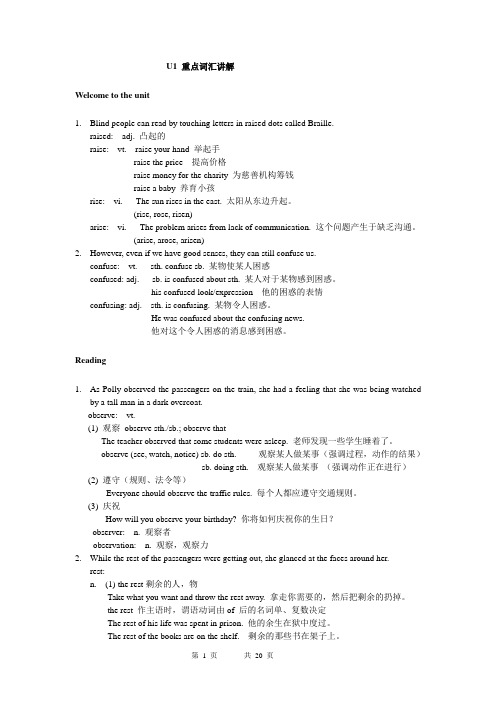
U1 重点词汇讲解Welcome to the unit1.Blind people can read by touching letters in raised dots called Braille.raised: adj. 凸起的raise: vt. raise your hand 举起手raise the price 提高价格raise money for the charity 为慈善机构筹钱raise a baby 养育小孩rise: vi. The sun rises in the east. 太阳从东边升起。
(rise, rose, risen)arise: vi. The problem arises from lack of communication. 这个问题产生于缺乏沟通。
(arise, arose, arisen)2.However, even if we have good senses, they can still confuse us.confuse: vt. sth. confuse sb. 某物使某人困惑confused: adj. sb. is confused about sth. 某人对于某物感到困惑。
his confused look/expression 他的困惑的表情confusing: adj. sth. is confusing. 某物令人困惑。
He was confused about the confusing news.他对这个令人困惑的消息感到困惑。
Reading1.As Polly observed the passengers on the train, she had a feeling that she was being watchedby a tall man in a dark overcoat.observe: vt.(1) 观察observe sth./sb.; observe thatThe teacher observed that some students were asleep. 老师发现一些学生睡着了。
人教高中英语必修三Unit1课本知识点复习
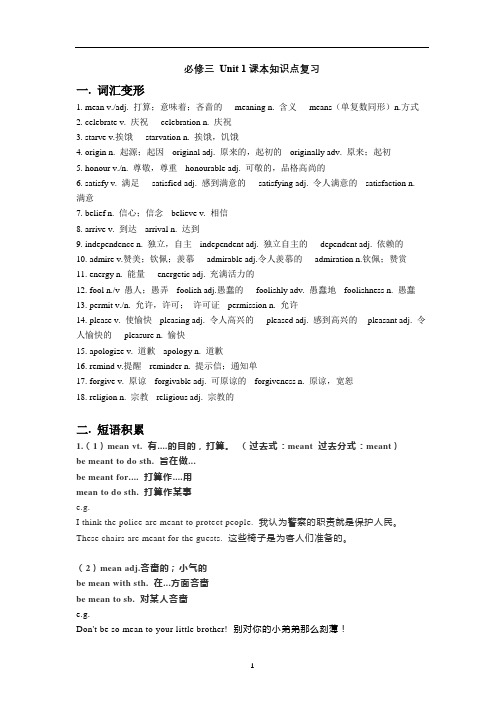
必修三Unit 1课本知识点复习一. 词汇变形1. mean v./adj. 打算;意味着;吝啬的-- meaning n. 含义-- means(单复数同形)n.方式2. celebrate v. 庆祝-- celebration n. 庆祝3. starve v.挨饿-- starvation n. 挨饿,饥饿4. origin n. 起源;起因-- original adj. 原来的,起初的-- originally adv. 原来;起初5. honour v./n. 尊敬,尊重-- honourable adj. 可敬的,品格高尚的6. satisfy v. 满足-- satisfied adj. 感到满意的-- satisfying adj. 令人满意的-- satisfaction n. 满意7. belief n. 信心;信念-- believe v. 相信8. arrive v. 到达-- arrival n. 达到9. independence n. 独立,自主-- independent adj. 独立自主的-- dependent adj. 依赖的10. admire v.赞美;钦佩;羡慕-- admirable adj.令人羡慕的-- admiration n.钦佩;赞赏11. energy n. 能量-- energetic adj. 充满活力的12. fool n./v 愚人;愚弄-- foolish adj.愚蠢的-- foolishly adv. 愚蠢地-- foolishness n. 愚蠢13. permit v./n. 允许,许可;许可证-- permission n. 允许14. please v. 使愉快-- pleasing adj. 令人高兴的-- pleased adj. 感到高兴的--pleasant adj. 令人愉快的-- pleasure n. 愉快15. apologize v. 道歉-- apology n. 道歉16. remind v.提醒-- reminder n. 提示信;通知单17. forgive v. 原谅-- forgivable adj. 可原谅的-- forgiveness n. 原谅,宽恕18. religion n. 宗教-- religious adj. 宗教的二. 短语积累1.(1)mean vt. 有....的目的,打算。
人教版高中英语必修三Unit 1 重难点知识点总结
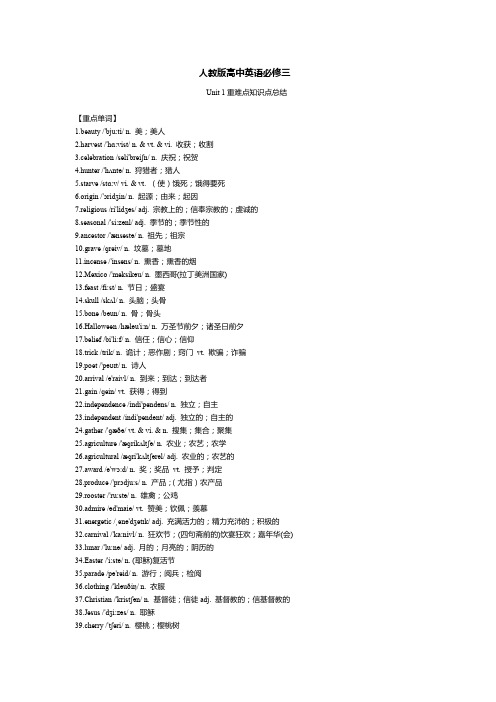
人教版高中英语必修三Unit 1重难点知识点总结【重点单词】1.beauty /'bju:ti/ n. 美;美人2.harvest /'hɑ:vist/ n. & vt. & vi. 收获;收割3.celebration /seli'breiʃn/ n. 庆祝;祝贺4.hunter /'hʌntə/ n. 狩猎者;猎人5.starve /stɑ:v/ vi. & vt. (使)饿死;饿得要死6.origin /'ɔridʒin/ n. 起源;由来;起因7.religious /ri'lidʒəs/ adj. 宗教上的;信奉宗教的;虔诚的8.seasonal /'si:zənl/ adj. 季节的;季节性的9.ancestor /'ænsestə/ n. 祖先;祖宗10.grave /ɡreiv/ n. 坟墓;墓地11.incense /'insens/ n. 熏香;熏香的烟12.Mexico /'meksikəu/ n. 墨西哥(拉丁美洲国家)13.feast /fi:st/ n. 节日;盛宴14.skull /skʌl/ n. 头脑;头骨15.bone /bəun/ n. 骨;骨头16.Halloween /hæləu'i:n/ n. 万圣节前夕;诸圣日前夕17.belief /bi'li:f/ n. 信任;信心;信仰18.trick /trik/ n. 诡计;恶作剧;窍门vt. 欺骗;诈骗19.poet /'pəʊɪt/ n. 诗人20.arrival /ə'raivl/ n. 到来;到达;到达者21.gain /ɡein/ vt. 获得;得到22.independence /indi'pendəns/ n. 独立;自主23.independent /indi'pendənt/ adj. 独立的;自主的24.gather /'ɡæðə/ vt. & vi. & n. 搜集;集合;聚集25.agriculture /'æɡrikʌltʃə/ n. 农业;农艺;农学26.agricultural /æɡri'kʌltʃərəl/ adj. 农业的;农艺的27.award /ə'wɔ:d/ n. 奖;奖品vt. 授予;判定28.produce /'prɔdju:s/ n. 产品;(尤指)农产品29.rooster /'ru:stə/ n. 雄禽;公鸡30.admire /əd'maiə/ vt. 赞美;钦佩;羡慕31.energetic /ˌenə'dʒetɪk/ adj. 充满活力的;精力充沛的;积极的32.carnival /'ka:nivl/ n. 狂欢节;(四句斋前的)饮宴狂欢;嘉年华(会)33.lunar /'lu:nə/ adj. 月的;月亮的;阴历的34.Easter /'i:stə/ n. (耶稣)复活节35.parade /pə'reid/ n. 游行;阅兵;检阅36.clothing /'kləuðiŋ/ n. 衣服37.Christian /'kristʃən/ n. 基督徒;信徒adj. 基督教的;信基督教的38.Jesus /'dʒi:zəs/ n. 耶稣39.cherry /'tʃeri/ n. 樱桃;樱桃树40.blossom /'blɔsəm/ n. 花vi. 开花41.custom /'kʌstəm/ n. 习惯;风俗42.worldwide /'wə:ldwaid/ adj. 遍及全世界的;世界性的43.rosebud /'rəuzbʌd/ n. 玫瑰花蕾44.fool /fu:l/ n. 愚人;白痴;受骗者adj. 傻的vt. 愚弄;欺骗vi. 干傻事;开玩笑45.necessity /ni'sesəti/ n. 必要性;需要46.permission /pə'miʃn/ n. 许可;允许47.prediction /pri'dikʃn/ n. 预言;预报;预告48.fashion /'fæʃn/ n. 样子;方式;时尚49.parking /'pɑ:kiŋ/ n. (汽车等)停放50.apologize /ə'pɔlədʒaiz/ vi. 道歉;辩白51.drown /draun/ vt. & vi. 淹没;溺死;淹死52.sadness /'sædnis/ n. 悲哀;悲伤53.obvious /'ɔbviəs/ adj. 明显的;显而易见的54.wipe /waip/ vt. 擦;揩;擦去55.weave /wi:v/ vt. & vi. (wove/wəuv/,woven/'wəuvn/) 编织;(使)迂回前进56.herd /hə:d/ n. 牧群;兽群57.magpie /'mæɡpai/ n. 喜鹊58.weep /wi:p/ vi. (wept, wept) 哭泣;流泪n. 哭;哭泣59.announcer /ə'naunsə/ n. 广播员;告知者;报幕员60.remind /ri'maind/ vt. 提醒;使想起61.forgive /fə'ɡiv/ vt. (forgave /fə'ɡeiv/, forgiven /fə'ɡivn/ )原谅;饶恕【重点短语】1.mean doing sth. 意味着做某事2.mean to do sth. 打算或企图做某事3.be meant for 打算作……用4.take place 发生;举行5.of all kinds 各种各样的6.starve to death饿死7.be starved of 缺乏8.starve for ... / starve to do... 渴望……9.plenty of 大量; 充足10.be satisfied with对……感到满意11.to one’s satisfaction感到满意是12.in the shape of呈……的形状;以……形式13.in memory of sb./ to the memory of sb. 纪念某人14.dress up 穿衣服;打扮;化装15.award sth.(to sb.) 授予(某人)某物16.award sb. sth.(for ...) (因……)授予某人某物17.reward sb. for... 因……奖赏某人18.reward sb. with sth. 用某物酬劳某人19.admire sb. for... 因……钦佩某人20.look forward to期望,期待,盼望21.turn up 出现;把(收音机等)音量开大些22.turn down 拒绝;把(收音机等)音量开小些23.turn off 关掉24.turn on 打开25.turn out 结果是……26.turn to sb. for help 向某人求助27.keep one’s word 守信28.break one’s word 失信【重点句型】1.Please make sure when and where the accident took place.请查清楚事故是何时何地发生的。
高中英语必修三第一单元知识点总结教学提纲

高中英语必修三第一单元知识点总结高中英语必修三第一单元知识点总结高中英语必修三第一单元知识点总结第一单元1)starve作不及物动词,表示“饿死,挨饿”。
starve for=be starve of/for,表示“渴望获得,迫切得到”。
2)pl作不可数名词,只用于肯定句中,表示“充足,大量,富裕”,可做主语,宾语或表语。
做主语时,谓语动词随着plenty所指的单复数形式作相应的变化。
plenty也可作副词,表示“充分地,十足地,好多”。
lenty表示“大量的,丰富,充裕”可作表语,定语,状语。
3)sa作及物动词,表示“满意,使满足”,直接跟宾语,若接that从句时,意思是“使相信”,从句前有间接宾语。
satisfy…with以……满足be satisfied with对……满足satisfy…for向……偿还be satisfied to do sth满足于做某事4)harm作名词,意为“损害”,不与不定冠词连用,常与do,come,mean等动词搭配。
darm than good弊大于利There’s no harm in(sb’s)doing sth=It dab to do sth做某事无害处作及物动词,表示“损害,伤害”。
5)lead作及物动词,表示“领导,引导”其宾语常接介词短语或者副词作宾补。
表示“影响,致使”时,后接介词to,也可以接不定式。
lead sb into使某人陷入某种不良的状态。
lead sb away使盲从,常用于被动语态。
lead nowhere毫无结果,,对……不起作用。
lead u作为……准备,导致。
lead sb b牵着某人的鼻子,完全操纵某人lead a dog’s life过困难的生活lead sb believe that使某人相信(假的事情或不确切的事情)lead the way带路,带头lead作为名词,give sb a lead给某人做出榜样,提示某人6)origin是名词,表示“起源,起因,出身”。
完整版高中英语必修三第一单元总结复习教案
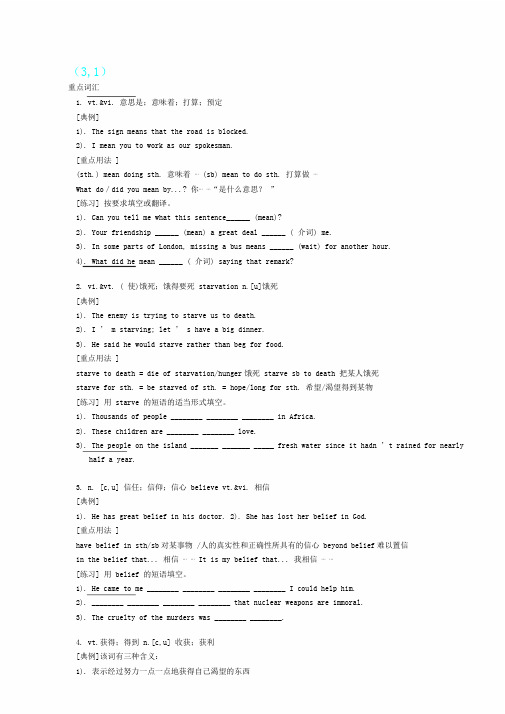
(3,1)重点词汇1. vt.&vi. 意思是;意味着;打算;预定[典例]1). The sign means that the road is blocked.2). I mean you to work as our spokesman.[重点用法 ](sth.) mean doing sth. 意味着⋯ (sb) mean to do sth. 打算做⋯What do/did you mean by...? 你⋯⋯“是什么意思?”[练习] 按要求填空或翻译。
1). Can you tell me what this sentence______ (mean)?2). Your friendship ______ (mean) a great deal ______ ( 介词) me.3). In some parts of London, missing a bus means ______ (wait) for another hour.4). What did he mean ______ ( 介词) saying that remark?2. vi.&vt. ( 使)饿死;饿得要死 starvation n.[u]饿死[典例]1). The enemy is trying to starve us to death.2). I ’ m starving; let ’ s have a big dinner.3). He said he would starve rather than beg for food.[重点用法 ]starve to death = die of starvation/hunger饿死 starve sb to death 把某人饿死starve for sth. = be starved of sth. = hope/long for sth. 希望/渴望得到某物[练习] 用 starve 的短语的适当形式填空。
英语必修三unit1[思维导图知识点知识树复习资料]人教版高中英语
![英语必修三unit1[思维导图知识点知识树复习资料]人教版高中英语](https://img.taocdn.com/s3/m/ccc16c63cfc789eb162dc80e.png)
egg hunts
Thanksgiving Day is an American traditional holiday, falling on the fourth Thursday in November, to commemorate the harvest.
The traditional food are roastingturkey, corn and pumpkin pieswith ice-cream.
Festival National
Day
Spring Festival
Time of Year / date What it celebrate What people do
October 1
the founding of the People ’ s Republic of China in 1949
1.What did people celebrate in ancient times three times of the year ?
a. The end of The cold weather; b. Planting in spring and harvest in autumn; c. When hunters could catch animals.
Read the passage again. Finish the following activities.
Use the information from the passage to answer the questions.
1. What are festivals of the dead usually for?
Teacher ’ s Day
2020学年人教版高中英语必修三Unit1知识点归纳总结
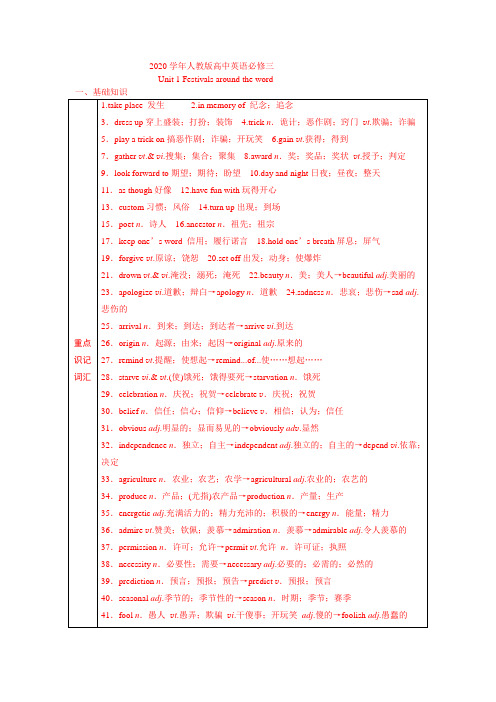
2020学年人教版高中英语必修三Unit 1 Festivals around the word二、重点单词突破1 satisfy v.使满意,使满足;满足(需求、需要等)[应试指导]写作高分句式:What satisfied sb.is that...替换to one’s satisfaction他对赢得比赛感到满意。
[夯实基础](1)用satisfy的适当形式填空①None of these is particularly satisfying.②We are not satisfied with these results.③Both sides expressed satisfaction with the progress so far.④We just can’t find enough good second-hand cars to satisfy demands.⑤From his satisfied voice on the phone I know everything is going under way.(2)The teacher was satisfied with his test results and praised him.Satisfied with his test results,the teacher praised him.(用过去分词作状语改写句子)2dress v.给……穿衣;穿着;打扮;n.衣裙;女装;衣服[应试指导]过去分词作定语、状语的考查休穿戴整洁地上班去了。
The boys were all dressed up as pirates.这些男孩子都装扮成了海盗。
[词义辨析]wear,have on,dress,put on(1)wear和have on表示“穿着”的状态,wear同时表示“佩戴”,并可以用于进行时,后还可以跟表示颜色的名词,而have on不行。
高中英语必修三第一单元重点

高中英语必修三第一单元重点、难点Unit one Festivals around the world1、Discuss when they take place. 讨论一下它们什么时候发生。
take place 发生When did the wedding take place 婚礼是什么时候举行的。
The opening of the play will take place tomorrow night. 这出戏明天晚上开场演出。
易混辨析:happen; take place; break out 发生happen指“偶然发生〞。
还可指运动会的“举行〞。
可以和occure互换,但occure有“It occures/ occurred to sb. that…突然想起〞句型,happen没有此句型。
A traffic accident happened in the street this morning. 今天早上大街上发生了一起交通事故。
take place指“有方案,有安排让发生〞。
Great changes have taken place in China in the past 30 years. 过去三十年中国发生了巨大变化。
break out“爆发〞。
多指爆发灾难性的事情,如战争、火灾、地震、瘟疫等。
The first world war broke out in 1914. 第一次世界大战1914年爆发。
特别提示:〔1〕happen; take place; break out 都没有被动式。
〔2〕take the place of表示“代替…的位置〞。
即时活用:1、A terrible accident ______ on No.6 Street yesterday, where a couple were killed by a truck.A. foldedB. broke outC. took placeD. occurred2、A quarrel ___________ last Sunday, and he ___________ his family.A. was broken out; broke awayB.broke out; broke awayC.was broke out; broke away fromD. broke out; broke away from3、Don’t you believe it! Glass can ________ steel in many ways in life.A. take place ofB. take the place ofC. in place ofD. instead of4、The question occurred to me ______ we were to get the machines mended. A. that B. what C. why D. where5、–When did the concert_____ ---Oh, two days ago.A. happenedB. take placeC. holdD. start 答案:DDBAB2、At that time people would starve if food was difficult to find, especially during the cold winter months.那个时候如果食物难找人会饿死的,尤其是寒冷的冬天。
(完整版)高中英语必修3第一单元知识点汇总
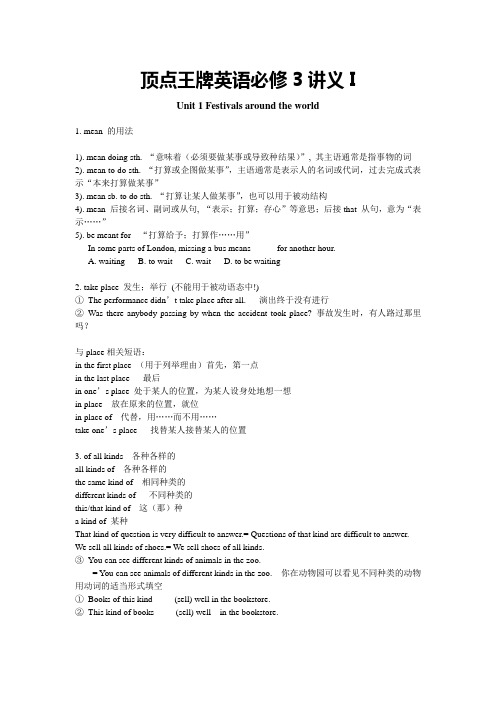
顶点王牌英语必修3讲义IUnit 1 Festivals around the world1. mean 的用法1). mean doing sth. “意味着(必须要做某事或导致种结果)”, 其主语通常是指事物的词2). mean to do sth. “打算或企图做某事”,主语通常是表示人的名词或代词,过去完成式表示“本来打算做某事”3). mean sb. to do sth. “打算让某人做某事”,也可以用于被动结构4). mean 后接名词、副词或从句, “表示;打算;存心”等意思;后接that 从句,意为“表示……”5). be meant for “打算给予;打算作……用”In some parts of London, missing a bus means _____ for another hour.A. waitingB. to waitC. waitD. to be waiting2. take place 发生;举行(不能用于被动语态中!)①The performance didn’t take place after all. 演出终于没有进行②Was there anybody passing by when the accident took place? 事故发生时,有人路过那里吗?与place相关短语:in the first place (用于列举理由)首先,第一点in the last place 最后in one’s place 处于某人的位置,为某人设身处地想一想in place 放在原来的位置,就位in place of 代替,用……而不用……take one’s place 找替某人接替某人的位置3. of all kinds 各种各样的all kinds of 各种各样的the same kind of 相同种类的different kinds of 不同种类的this/that kind of 这(那)种a kind of 某种That kind of question is very difficult to answer.= Questions of that kind are difficult to answer. We sell all kinds of shoes.= We sell shoes of all kinds.③You can see different kinds of animals in the zoo.= You can see animals of different kinds in the zoo. 你在动物园可以看见不同种类的动物用动词的适当形式填空①Books of this kind ____ (sell) well in the bookstore.②This kind of books ____ (sell) well in the bookstore.4. starve v. 挨饿; 饿死He said he would starve rather than beg for food. 他说他宁愿挨饿也不要饭吃5. plenty n. 富裕days/years/...of plenty 富裕的日子/年月如:You have a life of plenty, what would you be worried about?plenty pron. 大量; 充足plenty of可修饰可数名词和不可数名词, 用于陈述句如: You needn’t hurry. There is plenty of time left. 你不必慌忙, 剩下的时间很充足Taking plenty of exercise every day keeps you healthy. 每天多运动会使你身体健康6. 1) satisfy vt. 满足,使…满意; satisfy sb. satisfied a. 感到满意的; be satisfied with satisfying a. 令人愉快的satisfaction n. 满意; to one’s satisfactionsatisfactorily ad. 满意地satisfactory a. 令人满意的She bought a satisfactory computer—it’s cheap and of high q uality.辨析satisfactory, satisfied, satisfyingsatisfactory 指客观的事物或主观的表现达到要求而令人满意, 主语一般用客体satisfied指主体对事物或表现感到满意, 主语是主体(人)如: She is satisfied with the service. 她对该项服务感到满意satisfying: giving pleasure令人愉快, 主语是不定式. 常用于句型: It’s satisfying to do sth. 做...使人满意如:It’s satisfying to learn the success of his son in job-hunting. 得知儿子找到工作,令他非常高兴hurt, injure, harm, damage, wound的区别与用法hurt 普通用语,既可指肉体上的伤害,也可精神上, 感情上的伤害如:The girl hurt herself badly in the accident.那位女孩在那次事故中伤得很重injure比hurt正式, hurt多指伤痛, 而injure则指损害健康, 成就, 容貌等, 强调功能的损失如:He injured his hand while playing basketball.他在打篮球时手受了伤damage主要指对于物的损害,强调对于价值、用途、外观等所造成的损失, 这种损失或因自然灾害所致, 或因人为造成。
高一英语必修三知识点总结:Unit 1

高一英语必修三知识点总结:Unit 1以下是作者为大家整理的关于《高一英语必修三知识点总结:Unit 1》,供大家学习参考!Unit 1 Festivals around the world1. award sb. for… 某人因……而得奖= sb. be awarded for…The school awarded Mary a prize for her good work. 学校因玛丽杰出的工作而给她颁奖。
2. admire sb. for sth. 由于某事儿敬佩(或敬慕)某人Everybody admires him for his fine sense of humor. 人人都敬佩他那精妙的幽默感。
3. be meant to do sth. 被认为应做某事(尤指根据职责或命令、嘱咐等做某事)We are meant to write our names at the top of the paper. 我们应当把名字写在试卷的上方。
4. take place 产生(无被动情势,常指经过安排的事情)The interview is well planned and it is to take place on time. 采访计划周密,会按时进行的。
5. in memory of… 为了纪念……We sang the song in memory of the dead. 我们唱歌以纪念故去的人们。
6. dress up 穿上艳服;乔装装扮She likes to dress up for a party. 她爱好装扮得漂漂亮亮的去参加晚会。
begetdressed in… 穿着……的衣服7. The bride was dressed in white. 新娘穿一身白色的礼服。
8.look forward to +sth.doing sth.“盼望……”We look forward to the return of spring. 我们期待着春天的到来。
高一英语必修3unit1知识点总结计划

精品文档高一英语必修 3Unit1Festivalsaroundtheworlddoingsth.意味着 meantodosth.打算或企做某事meansb.todosth.打算某人做某事bemeantfor打算作⋯用2.takeplace生;行taketheplaceofsb=beinplaceofsb替代某人allkinds各种各的4..starvetodeath死bestarvedof sth.缺乏starvefor sth/starvetodo渴望satisfiedwith感到意toone’ssatisfaction感到意是...inmemoryof/inhonorof.念某人doharmtosb.=dosb.harm=beharmfultosb.害某人theshapeof呈⋯的形状sth.(tosb.)=awardsb.sth.(for sth.)予, rewardsb.forsth. 因...某人sb.withsth.用某物酬某人 .dressup打扮,化装sb.forsth在某方面佩某人forwardto期望,期待funwithsb. 玩得开心,得快=haveagoodtime=enjoyoneself.up.来,出;把音量开大些one’sword守信用16.breakone ’sword失信setoff身,出;使〔地雷、炸〕爆炸remindsb.ofsth.提醒,使想起remindsbtodosth提醒某人做某事19.forgivesb(for)sth 原某人某事forgivingadj. 容的20.apologizetosbfor(doing)sth=makeanapologytosbforsth 因某事向某人抱歉知识点归纳1.mean的用法1).meandoingsth.“意味着〔必要做某事或致种果〕〞,其主通常是指事物的。
2).meantodosth.“打算或企做某事〞,主通常是表示人的名或代,去完成式表示“本来打算做某事〞。
高中英语必修3 UNIT 1 知识点

高中英语必修3 UNIT 1 知识点一、教学内容必修3 Unit 1 Festivals around the world(一)重点单词(二)重点短语(三)重点句型二、知识精讲(一)重点单词1. belief n. 信任;信仰;信心He has great belief in his doctor. 他对他的医生无比信赖。
He came to me in the belief that I could help him.他到我这里来,相信我能帮助他。
The cruelty of the murders was beyond belief.凶手的残忍让人难以置信。
知识拓展:believe vt. & vi. believable / unbelievable adj.They need a leader they can believe in.他们需要一个可以信赖的领导。
Believe it or not, he asked me to marry him.信不信由你,他向我求婚了。
—Does he still work there? 他还在那里工作吗?—I believe so / not. 我想是/不是。
2. gain vt. 获得;得到; 赢得He has gained rich experience in these years.这些年他已获取了丰富的经验。
He has gained the respect of his friends.他赢得了朋友们的尊重。
He gained weight after recovery from his illness.康复后他的体重增加了。
I gained a lot by / from my former experience.我从以前的经验中学到很多东西。
知识拓展n. 收益;利润No pains; no gains.(谚语)不劳无获3. gather vt.采集;收集;积累;聚集The farmers are gathering (in ) crops in the field.农民们正在田野里收割庄稼。
高中英语必修三第一单元知识点总结
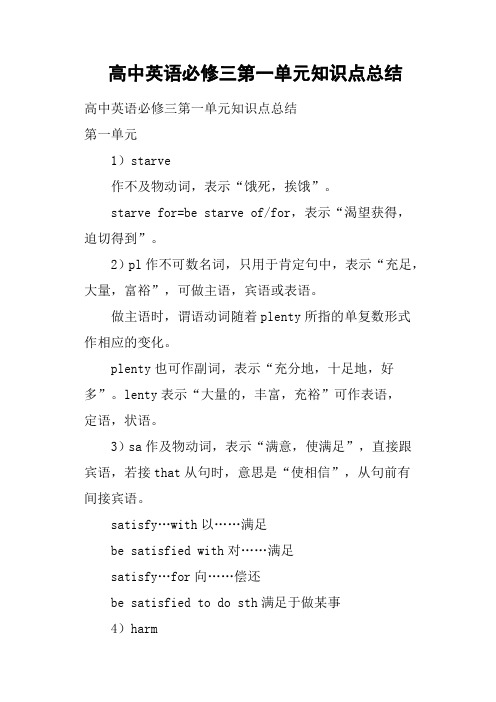
高中英语必修三第一单元知识点总结高中英语必修三第一单元知识点总结第一单元1)starve作不及物动词,表示“饿死,挨饿”。
starve for=be starve of/for,表示“渴望获得,迫切得到”。
2)pl作不可数名词,只用于肯定句中,表示“充足,大量,富裕”,可做主语,宾语或表语。
做主语时,谓语动词随着plenty所指的单复数形式作相应的变化。
plenty也可作副词,表示“充分地,十足地,好多”。
lenty表示“大量的,丰富,充裕”可作表语,定语,状语。
3)sa作及物动词,表示“满意,使满足”,直接跟宾语,若接that从句时,意思是“使相信”,从句前有间接宾语。
satisfy…with以……满足be satisfied with对……满足satisfy…for向……偿还be satisfied to do sth满足于做某事4)harm作名词,意为“损害”,不与不定冠词连用,常与do,come,mean等动词搭配。
darm than good弊大于利There’s no harm in(sb’s)doing sth=It dab to do sth做某事无害处作及物动词,表示“损害,伤害”。
5)lead作及物动词,表示“领导,引导”其宾语常接介词短语或者副词作宾补。
表示“影响,致使”时,后接介词to,也可以接不定式。
lead sb into使某人陷入某种不良的状态。
lead sb away使盲从,常用于被动语态。
lead nowhere毫无结果,,对……不起作用。
lead u作为……准备,导致。
lead sb b牵着某人的鼻子,完全操纵某人lead a dog’s life过困难的生活lead sb believe that使某人相信(假的事情或不确切的事情)lead the way带路,带头lead作为名词,give sb a lead给某人做出榜样,提示某人6)origin是名词,表示“起源,起因,出身”。
高中英语必修三第一单元语法总结
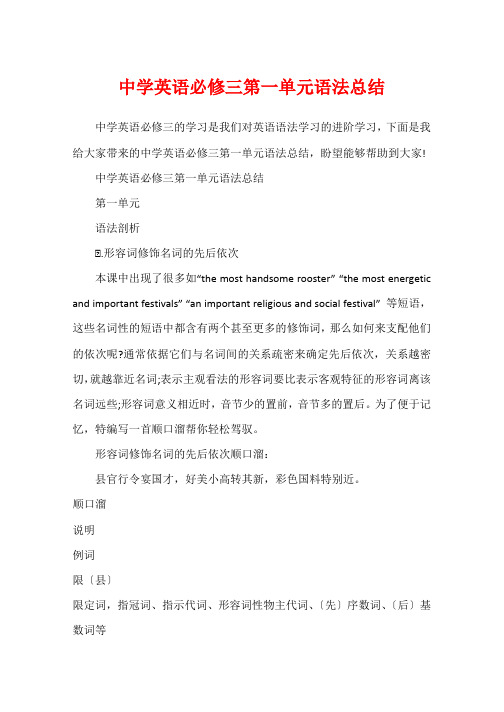
中学英语必修三第一单元语法总结中学英语必修三的学习是我们对英语语法学习的进阶学习,下面是我给大家带来的中学英语必修三第一单元语法总结,盼望能够帮助到大家!中学英语必修三第一单元语法总结第一单元语法剖析Ⅰ.形容词修饰名词的先后依次本课中出现了很多如“the most handsome rooster” “the most energetic and important festivals” “an important religious and social festival” 等短语,这些名词性的短语中都含有两个甚至更多的修饰词,那么如何来支配他们的依次呢?通常依据它们与名词间的关系疏密来确定先后依次,关系越密切,就越靠近名词;表示主观看法的形容词要比表示客观特征的形容词离该名词远些;形容词意义相近时,音节少的置前,音节多的置后。
为了便于记忆,特编写一首顺口溜帮你轻松驾驭。
形容词修饰名词的先后依次顺口溜:县官行令宴国才,好美小高转其新,彩色国料特别近。
顺口溜说明例词限〔县〕限定词,指冠词、指示代词、形容词性物主代词、〔先〕序数词、〔后〕基数词等a(n〕,the ,this ,several ,their ,first ,three ,other 观(官)外观词,指描绘性形容词〔多表主观看法〕Beautiful ,fine ,pretty形(行)形态词,指大小、长短、凹凸、方圆等Big ,long ,short ,round龄(令)年龄词,指新、旧等Old ,young ,new颜(宴)颜色词,指红、绿、蓝、白等Red ,green ,blue ,white国国籍词,指中国、美国等Chinese ,American材(才〕材料词,指木头、皮革、羊毛等Wooden ,leather ,woolenMight I use your pen?我能用你的钢笔吗?No,you mustnt.不,你不允许。
2)用于祈使句中表示祝愿。
必修3 Module 1外研社高中英语必修三单元一各知识点【精选】
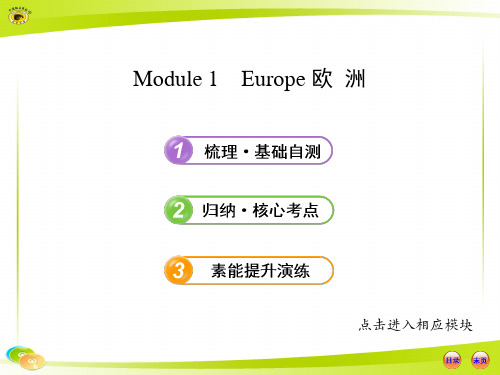
4.opposite prep. 在……对面/对过 n.对立面,对立物 adj.相对的;对立的,对面的 adv.在对面,在对过
opposite(to) sb. /sth . 在某人/某物的对面,与……相反 just the opposite 恰恰相反
①Getting into the train, the man found himself sitting opposite an old woman. 上了火车,男子发现自己坐在一个老太太的对面。 ②The garden lies on the opposite side of the street. 花园位于街道的对面。
【真题链接】
[2010湖北,21]This restaurant has become popular for its wide ______of foods that suit all tastes and pockets.
A. division B. area C. range D. circle
③Communicating with friends face to face is a way to relieve pressure from work and life. 与朋友面对面地交流是缓解工作和生活压力的一种方式。 ④_F_a_c_e_d _w_i_th_ such a great challenge, we are to meet it without hesitation. 面临如此巨大的挑战,我们要毫不犹豫地去面对它。
7.据……;依照…… 8.与……相比 9.另一方面;反过来说 10.控制 11.一点点地;逐渐地 12.属于
_i_n_t_e_r_m_s__o_f _ _c_o_m__p_a_r_ed__w__it_h_ _o_n__th_e__o_th__er__h_a_n_d__ _h_a_v_e__co_n__tr_o_l_o_v_e_r_ _l_it_t_le__b_y_l_it_t_le__ _b_e_l_o_n_g_t_o___
人教版高中英语必修3unit1课文知识点详解

late.
他知道自己被骗了,但为时已晚。
No one could work out how I did the card
tricks.
没有人能识破我的纸牌戏法。
2020/12/19
17
She has a trick of raising her eyebrows at the end of a question. 她有一个习惯,在提问题结束时总要扬起眉毛。 归纳总结 trick ___________; n.______________________。 play a trick/tricks on sb.捉弄某人 have a trick of doing sth.有做某事的习惯 trick sb.ivn.t欺o d骗o,in诈g骗sth.哄骗某人做某诡事计;恶作剧;窍门;习惯 trick sb.out of sth.骗取某人某物 laugh at sb.嘲笑某人 look down upon sb.歧视某人
death.
他们在沙漠中迷路了,饥饿而死。
归纳总结
starve __________________________。
starve to death饿死
starve for sth.渴望得到某物
starve sb.of sth.使某人得不到某物而受苦或渴望
获得某物
vi. & vt.(使)饿死;(使)挨饿
2020/12/19
16
4.trick If the neighbours do not give any sweets,the
children might play a _______ on them.(回归
课本P2) 观察思考
trick
He knew he had been tricked,but it was too
2020年人教版高中英语必修三Unit1知识点总结归纳
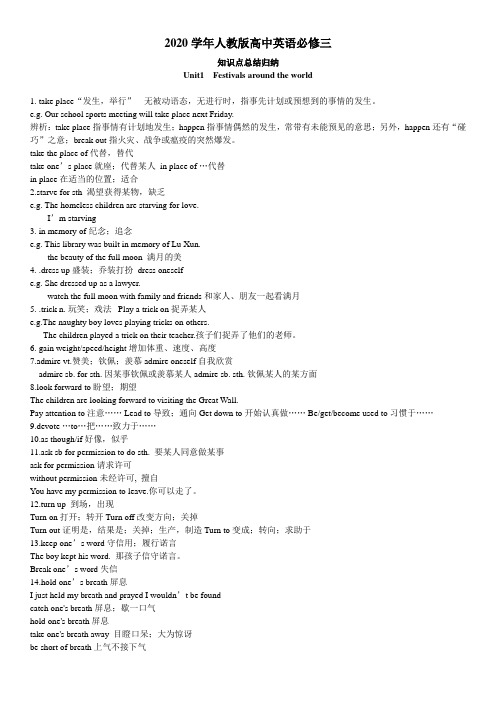
2020学年人教版高中英语必修三知识点总结归纳Unit1 Festivals around the world1. take place“发生,举行”无被动语态,无进行时,指事先计划或预想到的事情的发生。
e.g. Our school sports meeting will take place next Friday.辨析:take place指事情有计划地发生;happen指事情偶然的发生,常带有未能预见的意思;另外,happen还有“碰巧”之意;break out指火灾、战争或瘟疫的突然爆发。
take the place of代替,替代take one’s place 就座;代替某人 in place of …代替in place 在适当的位置;适合2.starve for sth 渴望获得某物,缺乏e.g. The homeless children are starving for love.I’m starving3. in memory of 纪念;追念e.g. This library was built in memory of Lu Xun.the beauty of the full moon 满月的美4. .dress up 盛装;乔装打扮dress oneselfe.g. She dressed up as a lawyer.watch the full moon with family and friends和家人、朋友一起看满月5. .trick n. 玩笑;戏法 Play a trick on 捉弄某人e.g.The naughty boy loves playing tricks on others.The children played a trick on their teacher.孩子们捉弄了他们的老师。
6. gain weight/speed/height 增加体重、速度、高度7.admire vt.赞美;钦佩;羡慕 admire oneself 自我欣赏admire sb. for sth. 因某事钦佩或羡慕某人 admire sb. sth. 钦佩某人的某方面8.look forward to 盼望;期望The children are looking forward to visiting the Great Wall.Pay attention to 注意…… Lead to 导致;通向 Get down to 开始认真做…… Be/get/become used to 习惯于……9.devote …to…把……致力于……10.as though/if 好像,似乎11.ask sb for permission to do sth. 要某人同意做某事ask for permission请求许可without permission未经许可, 擅自You have my permission to leave.你可以走了。
高一教案英语必修三第一单元学习重要知识点总结讲解

Unit1重要单词,词组讲解1.mean的用法Whatdoyoumeantodowithit? Ididn’t meantohurtyou.1〕meantodo意欲做Thismeansstayingherelonger.Missingthetrainmeanswaitingfor anotherhour.2〕meandoing意味着做Heisnotmeantforateacherandwillalwaysbeunhappyintheschool.Bemeantfor 适合做他说他不适合读书因为懒。
Hesayshe_________________astudentforhislaziness.这次考试失败意味着要再考一次。
Failingthisexam___________________anotherone.我并不是成心迟到的。
Ididn’t____________belateforschool.(1) 2.celebrate vt.庆祝;祝贺celebrate Christmas/one(2)赞扬;称颂’sbirthday/avictory(成功) Thenamesofmanyheroesarecelebratedbythepoets.词语辨析:celebrate,congratulatecelebrate后常接日期,事情或场合congratulate后常接人表示为某事而祝贺某人congratulatesb.on/uponsth.ex:congratulateyouonyourmarriage.有时还表示私自庆幸的意思。
ex:Icongratulatedmyselfonmyescapefrombeingpunished.英语中表示“发生〞的词或短语均为不及物,不用于被动语态。
主语为所发生的事。
词语辨析:takeplace,happen,occur,comeabout,breakout的比较1〕Theweddingwilltakeplacetomorrow.2〕In1919,theMay4thMovementtookplaceinChina.takeplace发生,举行;侧重安排或方案而发生的事,带有“非偶然〞的意思3)Whathashappenedtoher?碰巧,恰好happen“发生〞,普通用词,含义很广。
- 1、下载文档前请自行甄别文档内容的完整性,平台不提供额外的编辑、内容补充、找答案等附加服务。
- 2、"仅部分预览"的文档,不可在线预览部分如存在完整性等问题,可反馈申请退款(可完整预览的文档不适用该条件!)。
- 3、如文档侵犯您的权益,请联系客服反馈,我们会尽快为您处理(人工客服工作时间:9:00-18:30)。
顶点王牌英语必修3讲义IUnit 1 Festivals around the world1. mean 的用法1). mean doing sth. “意味着(必须要做某事或导致种结果)”, 其主语通常是指事物的词2). mean to do sth. “打算或企图做某事”,主语通常是表示人的名词或代词,过去完成式表示“本来打算做某事”3). mean sb. to do sth. “打算让某人做某事”,也可以用于被动结构4). mean 后接名词、副词或从句, “表示;打算;存心”等意思;后接that 从句,意为“表示……”5). be meant for “打算给予;打算作……用”In some parts of London, missing a bus means _____ for another hour.A. waitingB. to waitC. waitD. to be waiting2. take place 发生;举行(不能用于被动语态中!)①The performance didn’t take place after all. 演出终于没有进行②Was there anybody passing by when the accident took place? 事故发生时,有人路过那里吗?与place相关短语:in the first place (用于列举理由)首先,第一点in the last place 最后in one’s place 处于某人的位置,为某人设身处地想一想in place 放在原来的位置,就位in place of 代替,用……而不用……take one’s place 找替某人接替某人的位置3. of all kinds 各种各样的all kinds of 各种各样的the same kind of 相同种类的different kinds of 不同种类的this/that kind of 这(那)种a kind of 某种That kind of question is very difficult to answer.= Questions of that kind are difficult to answer. We sell all kinds of shoes.= We sell shoes of all kinds.③You can see different kinds of animals in the zoo.= You can see animals of different kinds in the zoo. 你在动物园可以看见不同种类的动物用动词的适当形式填空①Books of this kind ____ (sell) well in the bookstore.②This kind of books ____ (sell) well in the bookstore.4. starve v. 挨饿; 饿死He said he would starve rather than beg for food. 他说他宁愿挨饿也不要饭吃5. plenty n. 富裕days/years/...of plenty 富裕的日子/年月如:You have a life of plenty, what would you be worried about?plenty pron. 大量; 充足plenty of可修饰可数名词和不可数名词, 用于陈述句如: You needn’t hurry. There is plenty of time left. 你不必慌忙, 剩下的时间很充足Taking plenty of exercise every day keeps you healthy. 每天多运动会使你身体健康6. 1) satisfy vt. 满足,使…满意; satisfy sb. satisfied a. 感到满意的; be satisfied with satisfying a. 令人愉快的satisfaction n. 满意; to one’s satisfactionsatisfactorily ad. 满意地satisfactory a. 令人满意的She bought a satisfactory computer—it’s cheap and of high q uality.辨析satisfactory, satisfied, satisfyingsatisfactory 指客观的事物或主观的表现达到要求而令人满意, 主语一般用客体satisfied指主体对事物或表现感到满意, 主语是主体(人)如: She is satisfied with the service. 她对该项服务感到满意satisfying: giving pleasure令人愉快, 主语是不定式. 常用于句型: It’s satisfying to do sth. 做...使人满意如:It’s satisfying to learn the success of his son in job-hunting. 得知儿子找到工作,令他非常高兴hurt, injure, harm, damage, wound的区别与用法hurt 普通用语,既可指肉体上的伤害,也可精神上, 感情上的伤害如:The girl hurt herself badly in the accident.那位女孩在那次事故中伤得很重injure比hurt正式, hurt多指伤痛, 而injure则指损害健康, 成就, 容貌等, 强调功能的损失如:He injured his hand while playing basketball.他在打篮球时手受了伤damage主要指对于物的损害,强调对于价值、用途、外观等所造成的损失, 这种损失或因自然灾害所致, 或因人为造成。
如: Several cars were damaged in the accident. 好几辆汽车在事故中损坏了wound 指枪伤, 刀伤, 刺伤等皮肉之伤, 是出血的, 严重的伤, 特指战场上受伤, 它可以指肉体上的伤害, 也可指人们精神上的创伤。
如: The bullet wounded his left leg. 子弹打伤了他的左腿7.origin n. 起源;源头如:the origins of the life on earth 地球上生命的起源in memory of/ to the memory of sb. 纪念某人例句:The statue was built in memory of the famous scientist.8. dress作及物动词时, 不接clothes之类的表示衣服的名词, 而是接表示人的句词或代词, 意思是“给…穿衣服”。
当表示自己穿衣服时, 则用反身代词, 如:Wake up children and dressthem. 唤醒孩子,给他们穿上衣服dress的过去分词常用来构成get dressed与be dressed短语, 前者表示动态, 后者表示静态, 穿何种衣服, 则用介词in. 如:Harry up and get dressed. 快点穿上衣服。
The girl was dressed in red. 这个女孩穿着一身红衣服。
dress up是“打扮,化装”,如: You should dress up when you take part in the party.She is ___ in red today and looks very beautiful.wearing B. having on C. dressing D. Dressed9. award. n. 奖, 奖品v. 判给, 授予award sb. sth. 奖赏某人某物辨析: award 和reward:award后接双宾语如: award sb. a metal 授予某人奖章reward 奖赏, 酬谢, 不能接双宾语。
reward sb. for sth. 因…奖赏某人reward sb. with sth. 用某物酬劳某人例句:She rewarded herself with a cup of coffee after a whole morning’s hard work.10. admire v. 意为“赞赏;钦佩;羡慕;赞美;夸奖”注意: 表示“在某方面钦佩某人”用“admire sb. for sth.”例句:We all admire him for his courage and bravery. 我们都钦佩他的勇气和胆识11. look forward to (doing) sth. 意为期待着(做)某事, 其中的to是介词, 而不是动词不定式符号12. as though和as if没有什么区别。
as if用得普遍些, 却可引导方式状语从句和表语从句, 其从句谓语常用虚拟语气(1) 引导方式状语从句She acted as though nothing had happened.她装得好像什么事也没发生过似的当从句主语和主句主语一致,从句谓语中又含有动词to be时, 可以把主语和to be一起省去He looked about as though (he was) in search of something.他四处张望, 好像寻找什么(2) 引导表语从句It looks as if it’s going to rain看样子天要下雨as though和as if从句用虚拟语气, 还是用陈述语气,根据具体情况而定。
如果从句表示的意思与事实完全相反, 或者纯粹是一种假设, 通常用虚拟语气The child talks as if she were an adult. 那孩子说话的样子好像她是个大人13. have fun 过得快乐= have a good time, enjoy oneself. 短语有have fun ( in ) doing sth.14. But she didn’t turn up.1) 来, 出席(某活动) I’m very happy you turned up so early.2) 把(收音机等)音量开大一些, 反义词turn down. 如Turn up the radio a little, I can scarcely hear the program.turn down 拒绝turn off 关掉turn on 打开turn out 结果是..... turn to sb. for help 向某人求助15. keep one’s word 守信用,反义词是break one’s word 失信注意:keep one’s word和break one’s word中的名词word不能用复数形式!in a word/in short/to be short 简言之;总之have a word with sb. 与某人谈话have words with sb. 与某人发生口角in other words 换句话说16. obvious adj.1) obvious+ to + 表示人的名词或代词如:Her disappointment was obvious to her friend.2) It + be + obvious +that-clause 显而易见,一目了然如:It was obvious that she was in danger.辨析:obvious/apparent/clearobvious 是三者中程度最强的,含有“一目了然”之意。
